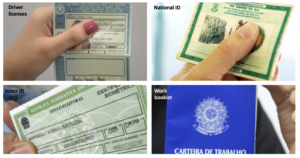Today was voting day in Brazil, municipal election. In a country with ID, work record booklet in paper and driver licenses is a paper, yes, I said paper. [see picture below for demonstration]

Although, the paper ID, Brazil started in 2019 with electronic work record by app and this year the voter ID became electronic an app also. An app where you can find your social security number, ID, residence information, and picture. Using a QR Code to vote and to present in the vote station
Just to make clear and give some context, vote in Brazil is mandatory from 18 to 70 years old, and as I am in Edinburgh, I need to inform that I am not voting and why.
Between reading the articles for this week classes, I downloaded the app and started the new digital process to have my voter ID. The app it is super simple, I included my social security number and all my information came through, I started the process of “no vote justification”, as it can be an “issue” not to justify your absence, during the process and my mother sharing with me her experience voting, using a QR code, and to have her information in an app, I thought about society 5.0 concept that was brought by Japan in 2016.
Society 5.0 is “is the intersection and high convergence between cyberspace (virtual space) and physical space (real space), in a technology human-centred society”, by Yuko Harayama. Executive Member, Council for Science, Technology and Innovation (CSTI), Cabinet Office of Japan.
The Prime Minister’s Office of Japan in 2018 launch a campaign about the Society 5.0:
Therefore, the other country that came in mind was Estonia, the digital republic, a Named ‘the most advanced digital society in the world’ by Wired, Estonia has built an efficient, secure and transparent ecosystem where 99% of governmental services are online”.
Supposing Brazil is going towards the society 5.0 directions, I realized that we have 11.3 million illiterate and 38 million functional illiterates, and to know to forget about the “Invisibles”. The 46 million individuals that do not appear on any Government ‘socio digital list’ in Brazil.
There is not a lot of academic work on that population, I brought the numbers by the Brazilian Institute of Geography and Statistics on the illiterate and about the “Invisibles” you can find some articles, but nothing too deep or from the academic world. Although, the Brazilian Institute of Geography and Statistics, does not reach all Brazilian population, and it was informed by the institute before. To be honest, the slums are not a priority or even the caatinga, a type of desert vegetation that you can find in the northeastern part of the country, and there are thousands of families living there.
I started to think on how a country with almost half of the population that don’t have digital access, because they are “Invisibles” or even by the illiterate rate, will be part of Society 5.0? Who wasn’t part of that digital transformation that happened in the voting process today in Brazil?
Those questions still in my mind without answers.
Reference
e-Estonia, Government site: https://e-estonia.com
Harayama, Yuko. Executive Member, Council for Science, Technology and Innovation (CSTI), Cabinet Office of Japan: https://www.weforum.org/people/yuko-harayama
Heller, Nathan. The New Yorker, Estonia, the Digital Republic:https://www.newyorker.com/magazine/2017/12/18/estonia-the-digital-republic
